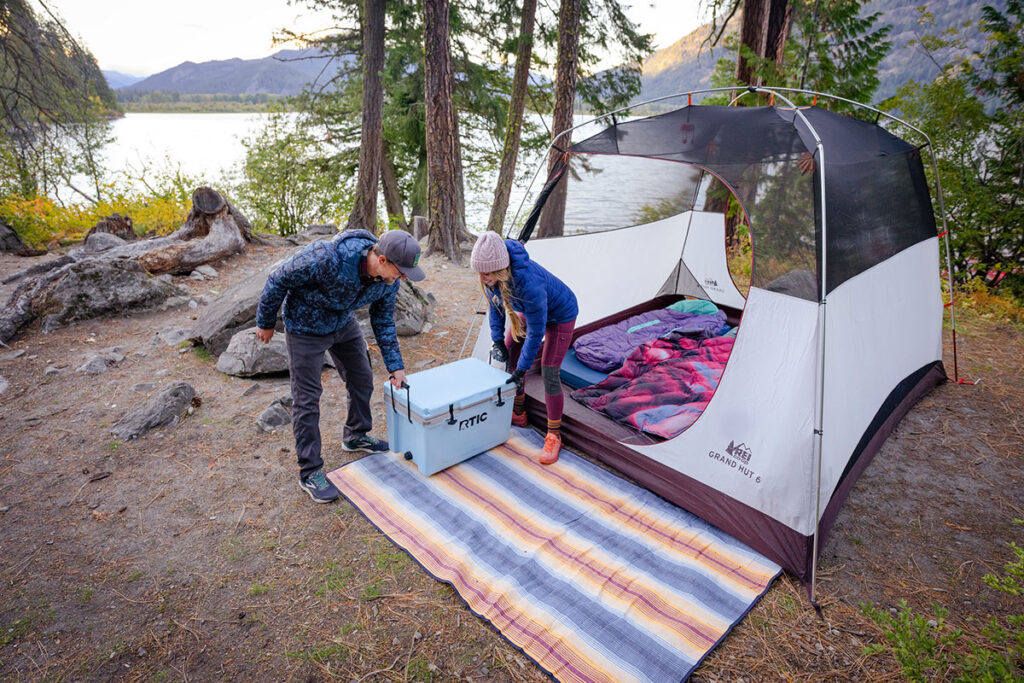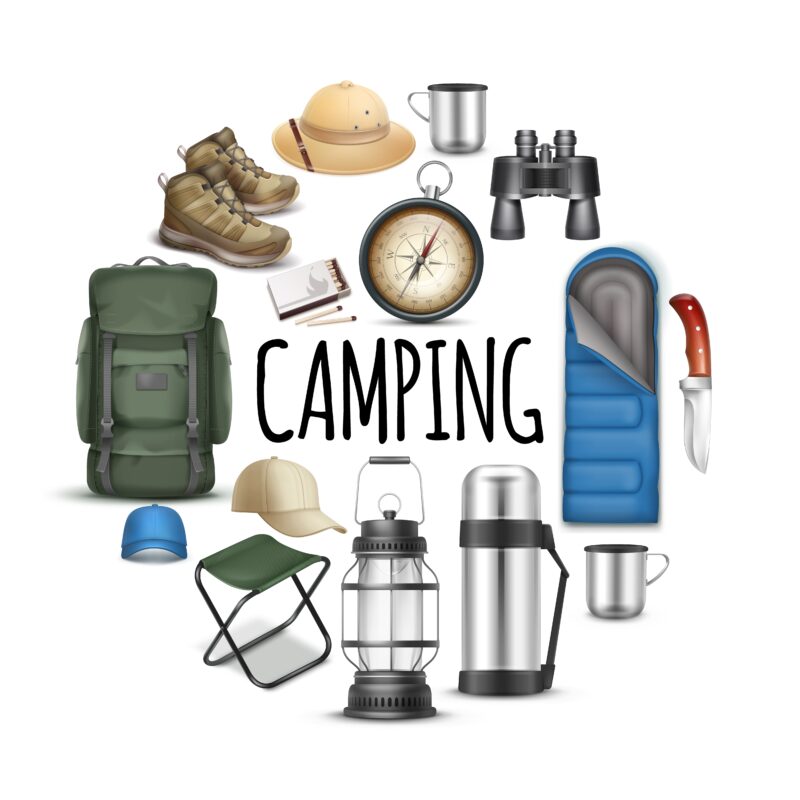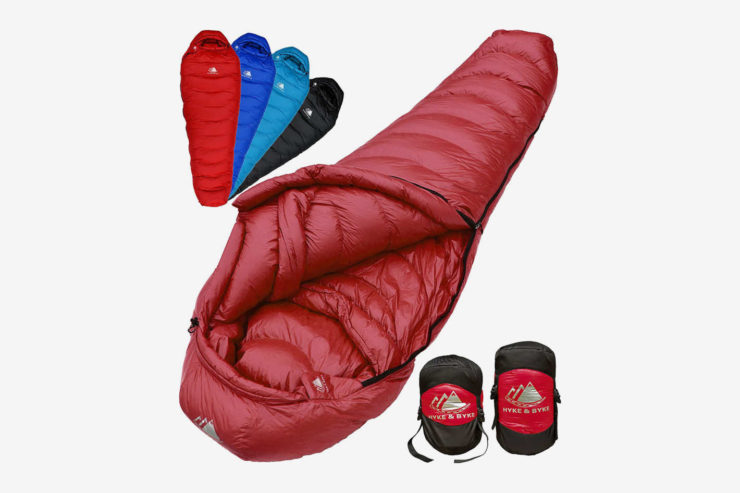Essential Guide to Choosing the Right Camping Gear
Updated: 11 Oct 2024
85
Camping is a rewarding experience that allows individuals to reconnect with nature, unplug from the daily grind, and explore the wilderness. However, to truly enjoy your outdoor adventure, having the right camping gear is essential. This comprehensive guide will help you make informed decisions about the equipment you need for a safe, comfortable, and enjoyable camping trip.
Introduction
Whether you’re a seasoned camper or a first-timer, choosing the right camping gear can make or break your outdoor experience. From selecting the perfect tent to picking the right sleeping bag and cookware, the process can be overwhelming, especially with the wide range of options available. This guide will help you navigate the essentials of camping equipment, ensuring you’re well-prepared for any camping scenario.
We’ll cover the fundamentals of gear selection, including tents, sleeping bags, cooking gear, backpacks, and clothing. Along the way, we’ll address common questions, provide practical advice, and bust a few myths about camping equipment.
Understanding the Basics of Camping Gear

Why Choosing the Right Camping Gear Matters
Before diving into the specifics, it’s important to understand why selecting the appropriate gear is crucial. The right Understanding Different Types of Camping helps you make informed decisions about the gear you’ll need. Proper camping equipment ensures:
- Comfort: Proper gear helps you sleep well, stay dry, and avoid fatigue.
- Safety: Reliable gear protects you from harsh weather, wildlife, and injuries.
- Convenience: Quality gear simplifies tasks like cooking, setting up camp, and staying organized.
Types of Camping and Gear Needs
The type of camping you engage in will determine the gear you need. There are various types of camping, and each requires different equipment:
- Backpacking Camping: Lightweight, portable gear is essential as you will carry everything on your back.
- Car Camping: You can pack more gear since space and weight aren’t as much of a concern.
- Glamping (Glamorous Camping): This luxury-style camping often involves high-end, comfortable gear for a more refined experience.
- Winter Camping: Specialized cold-weather gear is required to ensure warmth and safety in extreme conditions.
Essential Camping Gear

1. Tents: Your Home in the Wild
Types of Tents
A tent is your primary shelter, so choosing the right one is crucial. Tents come in various types, depending on the environment and your camping style:
- Dome Tents: Lightweight and easy to set up, these are ideal for most camping situations.
- Tunnel Tents: Offer more space but are bulkier, great for car camping or families.
- Geodesic Tents: Built for extreme weather, they provide maximum stability.
- Pop-Up Tents: Convenient for short trips, they require minimal effort but may lack durability.
Factors to Consider When Choosing a Tent
- Capacity: Consider the number of people and gear the tent needs to accommodate. Always go for a tent slightly larger than the number of campers.
- Weather Resistance: Look for waterproof materials, strong frames, and good ventilation for different weather conditions.
- Weight: If you’re backpacking, opt for a lightweight tent that’s easy to carry.
Example: For a weekend trip with a small group, a 3-season dome tent is perfect due to its balance between weight and weather protection.
2. Sleeping Bags: Keeping You Warm and Comfortable
A good night’s sleep is crucial for a successful camping trip, and choosing the right sleeping bag is key. Sleeping bags are categorized based on insulation, temperature rating, and design.
Types of Sleeping Bags

- Down Sleeping Bags: Lightweight and compact, but can lose insulation if wet.
- Synthetic Sleeping Bags: Bulkier but retain insulation even when damp, making them more versatile.
- Hybrid Sleeping Bags: Combine the benefits of both down and synthetic materials.
Temperature Ratings
Sleeping bags are rated for different temperatures:
- Summer Bags: Rated for 35°F and higher.
- 3-Season Bags: Rated between 10°F and 35°F.
- Winter Bags: Rated for temperatures below 10°F.
Design Considerations
- Mummy Bags: Offer maximum warmth and compact size but can feel restrictive.
- Rectangular Bags: Provide more space but are less efficient in retaining heat.
- Double Bags: Great for couples, offering space and warmth for two people.
Example: For a 3-season camping trip in mild conditions, a synthetic sleeping bag rated for 20°F will keep you warm and dry.
3. Sleeping Pads: Enhancing Your Comfort
Sleeping pads add insulation and cushioning between you and the ground. There are three main types:
- Foam Pads: Lightweight and durable, these are basic but effective.
- Self-Inflating Pads: Offer more comfort and insulation but can be heavier.
- Air Pads: Highly compact and adjustable, though they may be prone to punctures.
When selecting a sleeping pad, consider factors such as R-value (indicating insulation level), weight, and ease of inflation.
4. Backpacks: Carrying Your World
For backpackers, your backpack is one of the most important pieces of gear. It needs to be comfortable, durable, and the right size for your trip.
How to Choose the Right Backpack
- Capacity: Measured in liters, consider a 30-50L pack for short trips and 50-70L for extended adventures.
- Fit: The pack should distribute weight evenly across your hips and shoulders. Many backpacks come in different sizes, so ensure you get one that fits your torso length.
- Features: Look for features like multiple compartments, hydration compatibility, and rain covers.
Example: A 50L backpack with a sturdy frame is ideal for a multi-day hike, offering enough space for gear without being too bulky.
5. Cooking Gear: Fueling Your Adventure
A well-planned meal can boost your energy and morale while camping. Here’s a breakdown of essential cooking gear:
Stoves
There are two main types of camping stoves:
- Canister Stoves: Lightweight and easy to use, ideal for backpackers.
- Liquid Fuel Stoves: More versatile and perform well in cold temperatures, suitable for more experienced campers.
Cookware
- Pots and Pans: Look for lightweight and durable materials such as aluminum or titanium.
- Utensils and Cutlery: Choose compact, foldable items to save space.
- Coolers: Essential for car camping, they keep perishable food fresh.
Water Filtration Systems
In the backcountry, access to clean water is essential. You can choose from:
- Pump Filters: Effective but can be bulky.
- Gravity Filters: Convenient for groups.
- UV Purifiers: Lightweight and fast but require batteries.
Example: For a simple overnight camping trip, a lightweight canister stove and a titanium pot are sufficient for cooking basic meals.
Clothing and Footwear: Dressing for Success
Layering for Optimal Comfort
Dressing in layers allows you to regulate your body temperature more effectively in changing weather conditions. A good system includes:
- Base Layer: Moisture-wicking fabric to keep sweat off your skin.
- Insulating Layer: Fleece or down jacket to retain warmth.
- Outer Layer: A waterproof and windproof jacket to protect against the elements.
Footwear
Your footwear depends on the terrain and activity:
- Hiking Boots: Provide ankle support and are great for rough, uneven terrain.
- Trail Runners: Lighter and more flexible, suitable for well-maintained paths.
- Waterproof Shoes: Ideal for wet conditions or river crossings.
Common Mistakes to Avoid
Even seasoned campers can make mistakes when it comes to gear selection. Here are a few common pitfalls:
- Overpacking: Bring only what you need to avoid a heavy load.
- Ignoring the Weather: Always check the forecast and pack accordingly.
- Skipping Gear Tests: Set up your tent or try your gear at home before heading out to avoid surprises.
Conclusion: Planning for Success
Choosing the right camping gear is an essential part of preparing for any outdoor adventure. By considering factors such as the type of camping, weather conditions, and personal comfort, you can ensure a safe, enjoyable, and memorable experience. Whether you’re heading out for a weekend of car camping or embarking on a multi-day backpacking trek, investing in quality, reliable gear will always pay off.
Remember, preparation is key. So, take your time researching and selecting the gear that best fits your needs, and don’t be afraid to ask for advice from experienced campers or professionals at outdoor retailers.
FAQs, Choosing the Right Camping Gear
1. What are the essential camping gear items for beginners?
Beginners should focus on a tent, sleeping bag, sleeping pad or mat, backpack, cooking equipment (like a portable stove), water bottles, a first aid kit, and appropriate clothing for the weather.
2. How do I choose the right tent for camping?
Consider the size of the tent (how many people will use it), its seasonality (3-season tents are great for most conditions), weight, ease of setup, and whether you need added features like a vestibule for gear storage or extra ventilation.
3. What type of sleeping bag should I choose?
Sleeping bags come in different temperature ratings. Choose one based on the coldest temperature you expect to camp in. Also, decide between synthetic and down insulation, as each has different benefits in terms of warmth and weight.
4. How do I select a camping backpack?
Choose a backpack that fits your torso length and has an appropriate volume (liters) for the length of your trip. Look for features like padded straps, ventilation, and multiple compartments for easier organization.
5. What is the best cooking gear for camping?
A portable stove or camping-specific cookware is ideal. Choose lightweight, durable options that are easy to clean. Don’t forget utensils, a lighter, and any food storage containers if you plan to cook during your trip.
Please Write Your Comments